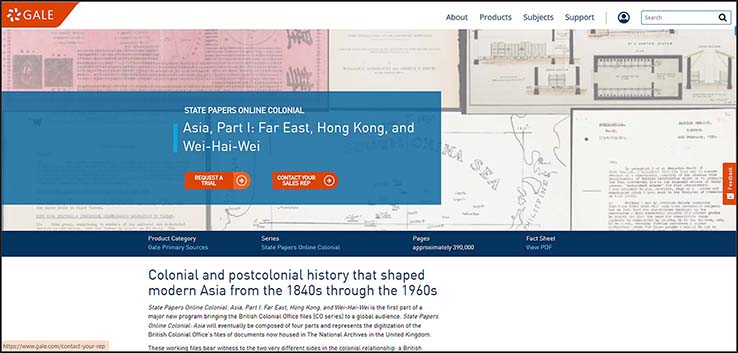State Papers Online Colonial: Asia (Far East, Hong Kong, and Wei-Hai-Wei), Part 1 | eReview
The first installment in Gale’s four-part State Papers Online Colonial series offers researchers unprecedented access to primary-source documents that reflect Britain’s complex history of trade and governance in East and Southeast Asia.
State Papers Online Colonial: Asia (Far East, Hong Kong, and Wei-Hai-Wei), Part 1; Gale
CONTENT This first installment in Gale’s four-part State Papers Online Colonial: Asia database provides access to recently digitized documents from the British Colonial Office’s files, now housed in the UK’s National Archives. Spanning 1570 to 1967, these documents provide insight into the early history of the East India Company and the transition from trading posts and colonial governance to decolonization in the Far East, Hong Kong, and Wei-Hai-Wei. In addition to revealing the British government’s focus on commodities, profits, and labor, the documents also provide information on health care, education, and the daily lives of local people living under British rule.
The archive contains a wide range of documents, including original correspondence, calendars, catalogues, monographs, registers, logbooks, maps, and photographs, comprising 3,690 volumes and 385,468 pages. The documents are superbly imaged in color, allowing users to clearly discern annotations and comments. The earliest documents reveal insights into the opium trade, rivalry with the Dutch, and the establishment of the first British Embassy to China. Later documents cover disparate topics such as rubber production, damage by locusts, reports on prisons, Kuomintang activities, policing, reconstruction after WWII, and much more.
USABILITY The streamlined homepage features a prominent search bar, a thorough “About” section, and options for browsing and accessing search history. Options include advanced search, a topic finder, and term frequency tools. Advanced search defaults to keyword searching but allows for additional options, including the entire document, title, reference number, place of writing, writer/author, recipient, and Gale number for the item. Searches can be limited by content type (calendars, manuscripts) and date. Users can also filter by collection or subcollection title, country/territory, regional focus, language, and types of illustrated works. The topic finder allows users to visualize connections between search terms, and the term frequency tool explores the coverage of search terms graphed over time.
Response time is outstanding, returning a list of easy-to-access results which provide basic record details, including title, author, date, series, source archive, document reference number, and metadata reference. Selecting an item defaults to the “Explore Document” view, which allows for searching within the document and viewing it as plain text (via OCR). Search term hits are highlighted, allowing for easy access. Users can also rotate, enlarge, and reduce the images or jump to a particular page within the document.
PRICING Pricing starts at $6,250, with a hosting fee that starts at $50 annually. Public library pricing is based on population served. Academic library pricing is based on an institution’s full-time enrollment and other institutional variables. Subscriptions are available upon request. Institutions holding two or more Gale Primary Source collections receive complimentary access to the Gale Primary Sources cross-search platform, which allows users to discover connections between other archival collections published by Gale. A free trial for the product can be requested at bit.ly/43mHOVt.
VERDICT State Papers Online Colonial: Asia offers researchers unprecedented access to primary-source documents that reflect Britain’s complex history of trade and governance in East and Southeast Asia. Enhanced by Gale’s responsive search tools, this is an excellent resource for students of British colonial, trade, and military histories
RELATED
ALREADY A SUBSCRIBER? LOG IN
We are currently offering this content for free. Sign up now to activate your personal profile, where you can save articles for future viewing










Add Comment :-
Comment Policy:
Comment should not be empty !!!